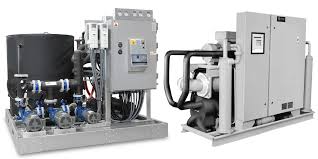Difference between a process chiller vs. HVAC chiller
3 min read
Chillers are crucial for keeping inside temperatures comfy and for maintaining a preferable environment. There are two basic types i.e. process chillers and HVAC chillers. While they both are mainly used for cooling purposes, but there is still difference between their working. However, if you have problems with your HVAC chiller system, professionals at https://www.socool.sg/ can help you out.
For resolving problems like aircon leaking water and other issues, visit https://www.socool.sg/why-is-your-aircon-leaking-or-dripping-water/ as there you can find the help you need to overcome it or hire a professional to resolve this for you.
Process chillers Vs. HVAC chillers:
While both process chillers and HVAC chillers work to maintain a pleasant temperature, their functions are distinct. In applications where precise cooling and great performance are critical, process chillers are utilized. Conversely, HVAC chillers are employed to maintain a comfortable interior environment in both commercial and residential buildings. Energy efficiency and user comfort are their primary goals. It is crucial to be aware of these differences in order to select an appropriate cooling system for a certain task, be it maintaining a comfortable indoor environment or an artificial process.
Repairing process:
Fixing and maintaining process chillers requires detailed and technical expertise. Only trained professionals with expertise in these cooling systems should be trusted with them. Repairs can be time-consuming, costly, and inconvenient for the processes they power. In contrast, HVAC chillers, which are a part of standard air conditioning systems, have an even more simple structure. Chillers like these are well-known among HVAC professionals, which facilitates better management of fixing issues and results in less disruptions for home occupants.
Purpose:
A process chiller, as its name implies, is substantially used to cool down operations within controlled surroundings, ensuring they work efficiently and reliably. You will generally find these specialized cooling systems in places like workshops, laboratories, and varied manufactured settings where they help maintain the right temperatures for processes and chemicals.
On the other hand, HVAC( Heating, Ventilation, and Air Conditioning) chillers are designed for a different purpose. They are used to keep the air inside marketable and domestic structures at a comfortable temperature, making the inner atmosphere favourable for people.
Temperature ranges:
The operational temperature range of process chillers can be adjusted to suit the unique temperature requirements of the artificial processes they support, ranging from very low to moderately high conditions. A process chiller in a chemical lab may be responsible for keeping temperatures below freezing, whereas a process chiller in a plant may be required to cool down machinery running at high temperatures.
In contrast, HVAC chillers are purpose-built to keep interior temperatures within a more manageable and energy-efficient range, often between 72 and 78 degrees Fahrenheit (22 and 26 degrees Celsius), to guarantee the comfort of occupants.
Fluids and refrigerants:
Typically, process chillers use refrigerants that are tailored to meet the specific requirements of the artificial processes they are used for. From glycol-based results to additional exceptional refrigerants, the selection of these fluids can differ based on the particular activity. In contrast, HVAC chillers are designed to work with widely used refrigerants like R-134a, R-410A, or R-22, which are known for their eco-friendly and energy-efficient properties.
Environmental regulations:
Because they employ specialized refrigerants that could have a greater effect on the environment, process chillers are subject to more stringent safety standards and regulations. To meet compliance criteria, it is vital to ensure the appropriate running and disposal of these substances. HVAC chillers are also subject to environmental requirements; however, the usage of widely recognized refrigerants makes adhering to these standards easier.
When choosing between a process chiller and an HVAC chiller, it’s essential to consider the specific conditions of your operation, as well as the differences in capacity, control, and environmental considerations. By making an informed decision, you can ensure that your cooling requirements are met efficiently and effectively.




